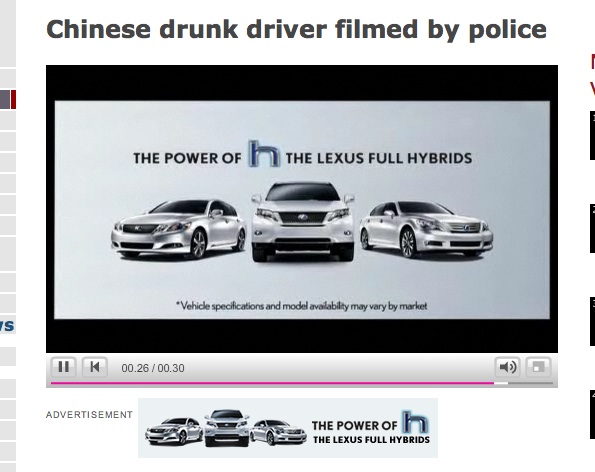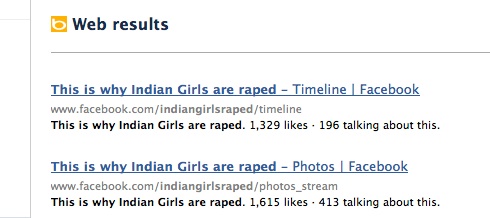A couple of years ago I wrote a blog post about negative brand association. You can read the story here.
I hate to say ‘I told you so’ but I’ve always said that in the social economy, the concept of using communications to try and position a product or service in the mind of a consumer is fraught with danger because it can backfire in many ways.
When I last discussed this issue, I mentioned a video on the BBC website that featured a drunk driver in China who was caught on film smashing into road dividers and barricades.
That video story was preceded by a commercial for Lexus! Here is a still image from the end of the commercial.

Interestingly, the story is still online but now the video is preceded by a commercial for the Philippines with an amusing if a little tactless play on the concept of parking! Which would suggest the ad placement is left to the media owner.
India spent millions and millions of dollars positioning the country as an incredible destination only for all their hard work to be undone in a matter of months this year as report after report came out about the rape and murder of women, tourists and children.
More recently, Facebook has been criticised not only for featuring customer ads on controversial sites, but also for reacting slowly to complaints from customers.
Dove, owned by Unilever the global Multinational Corporation that spends over US$1.5 billion per year on advertising, with an increasingly large percentage spent online was said to be furious when its ads on Facebook were featured on controversial group pages such as ‘Drop kicking sluts in the teeth’ and ‘Raping’.
Vodafone, another advertiser with a global marketing budget in excess of US$1.3 billion was particularly miffed when its ads appeared on the offensive Facebook page ‘This is why Indian girls are raped’.

Another advertiser affected in a similar way announced that it would review it’s advertising if Facebook could not ensure this didn’t happen again.
Facebook’s revenue from advertising in the last quarter was an impressive US$1.33 billion, up 41% on the previous quarter.
If Facebook wants to continue to see such massive increases in advertising revenue, it needs to sort out its processes and systems.
But it’s also the responsibility of CEOs, brand owners and managers who need to understand that in the social economy, using traditional methods to try and position brands is a lazy approach and unless they start to take control of their brands, the platforms they use and the way they communicate, they may find that their brands will suffer in the long term.
They will probably blame their advertising or media agency and they have a point but the real responsibility lies with them, the brand owner.

I’m in a PR class that requires me to check out these kind of situations regularly. I’m in no way a professional but I personally think that companies aren’t necessarily responsible for where thier ads are placed. However they are more than responsible for the way they handle any controversial situation. Facebook, in your example, should have responded much faster with more outward concern. Customers should always be the number one priority, so if customers are not happy a company should immediately respond.
LikeLike
Hi Manning
Thanks for dropping by and taking time to comment.
I think that if we need to apportion blame, it lies at the feet of a number of parties.
1) Facebook really shouldn’t allow groups such as ‘Why Indian girls get raped’ which essentially blamed women for getting raped because some women wear revealing clothing, ‘Drop kicking sluts in the teeth’ and anything else that is deemed offensive to the great majority of the population. Or they should get a third party to police the site.
2) The brands themselves need to be more aware of the potential of a platform like Facebook. Personally, my first request would be that the ads don’t appear on sites related to sex, religion etc and then drill down from there.
3) The ad agencies need to up their game. As digital spend rises, they can’t just assume it’ll be the same rules as traditional mass media. They need to offer more consulting to add value and part of that consulting will be to offer advice on Facebook and other platforms.
But we are in agreement on one issue, the response of Facebook or the lack of it. That was shocking and I think that Facebook will suffer as a result of the indifferent and slow response.
LikeLike